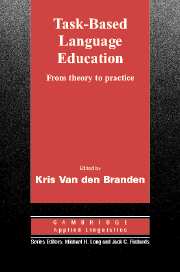Book contents
- Frontmatter
- Contents
- Acknowledgements
- Series Editors' Preface
- Chapter 1 Introduction: Task-based language teaching in a nutshell
- Chapter 2 From needs to tasks: Language learning needs in a task-based approach
- Chapter 3 Tasks for absolute beginners and beyond: Developing and sequencing tasks at basic proficiency levels
- Chapter 4 Developing language tasks for primary and secondary education
- Chapter 5 Task-based language teaching in science education and vocational training
- Chapter 6 Task-based language teaching and ICT: Developing and assessing interactive multimedia for task-based language teaching
- Chapter 7 Developing and introducing task-based language tests
- Chapter 8 The role of the teacher in task-based language teaching
- Chapter 9 A box full of feelings: Promoting infants' second language acquisition all day long
- Chapter 10 Training teachers: Task-based as well?
- References
- Subject Index
- Name Index
Chapter 9 - A box full of feelings: Promoting infants' second language acquisition all day long
Published online by Cambridge University Press: 05 May 2010
- Frontmatter
- Contents
- Acknowledgements
- Series Editors' Preface
- Chapter 1 Introduction: Task-based language teaching in a nutshell
- Chapter 2 From needs to tasks: Language learning needs in a task-based approach
- Chapter 3 Tasks for absolute beginners and beyond: Developing and sequencing tasks at basic proficiency levels
- Chapter 4 Developing language tasks for primary and secondary education
- Chapter 5 Task-based language teaching in science education and vocational training
- Chapter 6 Task-based language teaching and ICT: Developing and assessing interactive multimedia for task-based language teaching
- Chapter 7 Developing and introducing task-based language tests
- Chapter 8 The role of the teacher in task-based language teaching
- Chapter 9 A box full of feelings: Promoting infants' second language acquisition all day long
- Chapter 10 Training teachers: Task-based as well?
- References
- Subject Index
- Name Index
Summary
Introduction
Much like the previous chapter in this book, this chapter explores the role of the teacher in task-based language teaching. Its specific focus will be on second language classrooms populated by very young learners.
The literature on the role of the teacher in task-based language teaching (e.g. Nunan, 1989; Richards & Lockhart, 1994; Samuda, 2001; Chapter 8 in this volume) emphasizes that language teachers should attempt to motivate their students into using the target language for meaningful purposes and interactionally support the latter while doing so. Many of the tasks that teachers are supposed to bring to life in the classroom in a lively and motivating way challenge the students to solve complex problems, negotiate meaning while doing so and interact with their peer interlocutors and the teacher. Rather than solving problems themselves, teachers are supposed to build scaffolds that support the learner's own mental activity and, hence, the latter's cognitive and linguistic growth.
The question can be raised, however, whether teachers should, and can, abide by these principles with learners who lack the basic linguistic skills to take verbal initiative as well as the abstract levels of cognitive reasoning skills that many tasks involve. Such is, for instance, the case with extremely young second language learners (infants from 2.5 to 5 years of age) whose cognitive development has only reached pre-operational stages (Donaldson, 1984; Piaget, 1972; Satterly, 1987; Wood, 1998) that precludes abstract thinking and who, while not having fully developed their mother tongue skills to advanced levels, have to start acquiring a second language.
- Type
- Chapter
- Information
- Task-Based Language EducationFrom Theory to Practice, pp. 197 - 216Publisher: Cambridge University PressPrint publication year: 2006
- 3
- Cited by



